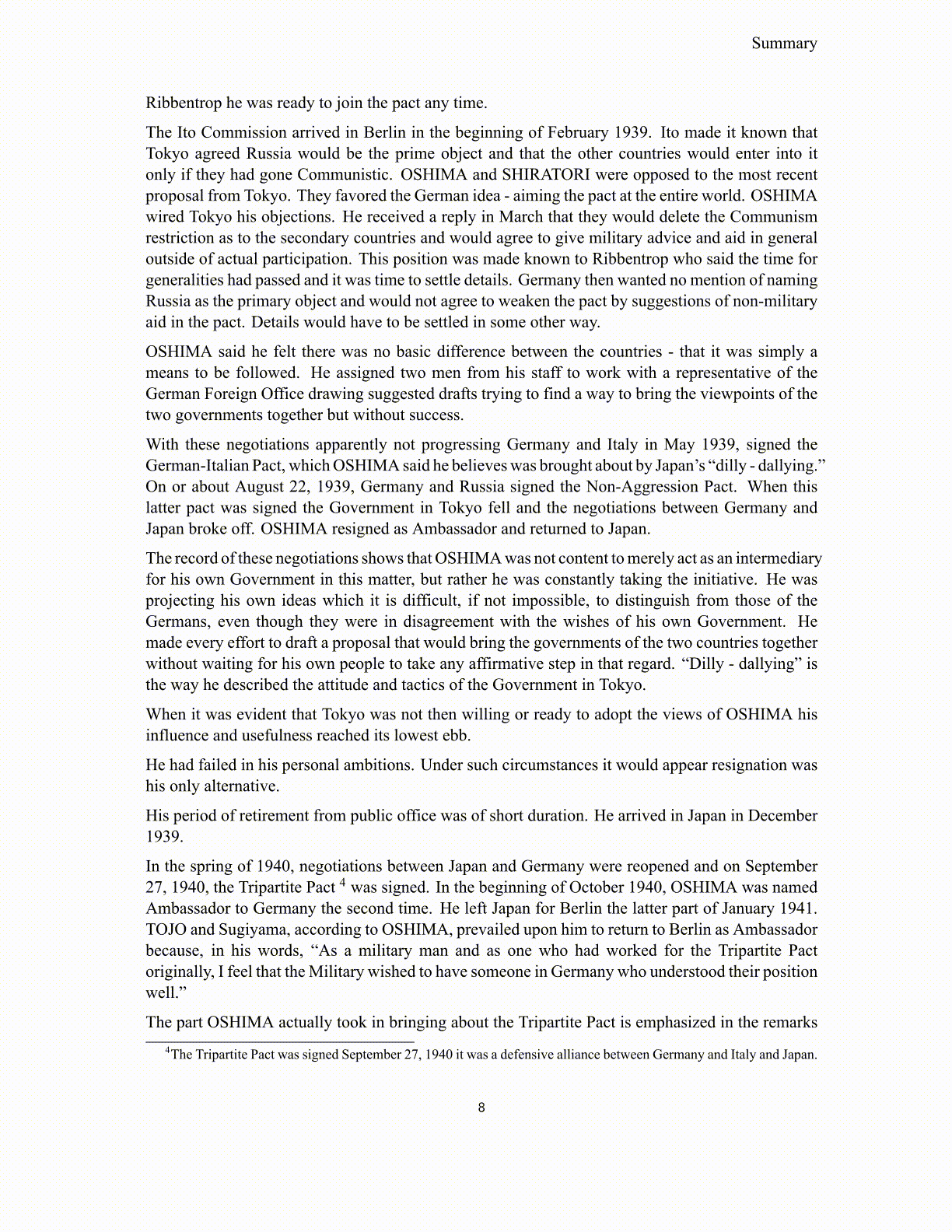
Summary Ribbentrop he was ready to join the pact any time. The Ito Commission arrived in Berlin in the beginning of February 1939. Ito made it known that Tokyo agreed Russia would be the prime object and that the other countries would enter into it only if they had gone Communistic. OSHIMA and SHIRATORI were opposed to the most recent proposal from Tokyo. They favored the German idea - aiming the pact at the entire world. OSHIMA wired Tokyo his objections. He received a reply in March that they would delete the Communism restriction as to the secondary countries and would agree to give military advice and aid in general outside of actual participation. This position was made known to Ribbentrop who said the time for generalities had passed and it was time to settle details. Germany then wanted no mention of naming Russia as the primary object and would not agree to weaken the pact by suggestions of non-military aid in the pact. Details would have to be settled in some other way. OSHIMA said he felt there was no basic difference between the countries - that it was simply a means to be followed. He assigned two men from his staff to work with a representative of the German Foreign Office drawing suggested drafts trying to find a way to bring the viewpoints of the two governments together but without success. With these negotiations apparently not progressing Germany and Italy in May 1939, signed the German-Italian Pact, which OSHIMA said he believes was brought about by Japan’s “dilly - dallying.” On or about August 22, 1939, Germany and Russia signed the Non-Aggression Pact. When this latter pact was signed the Government in Tokyo fell and the negotiations between Germany and Japan broke off. OSHIMA resigned as Ambassador and returned to Japan. The record of these negotiations shows that OSHIMA was not content to merely act as an intermediary for his own Government in this matter, but rather he was constantly taking the initiative. He was projecting his own ideas which it is difficult, if not impossible, to distinguish from those of the Germans, even though they were in disagreement with the wishes of his own Government. He made every effort to draft a proposal that would bring the governments of the two countries together without waiting for his own people to take any affirmative step in that regard. “Dilly - dallying” is the way he described the attitude and tactics of the Government in Tokyo. When it was evident that Tokyo was not then willing or ready to adopt the views of OSHIMA his influence and usefulness reached its lowest ebb. He had failed in his personal ambitions. Under such circumstances it would appear resignation was his only alternative. His period of retirement from public office was of short duration. He arrived in Japan in December 1939. In the spring of 1940, negotiations between Japan and Germany were reopened and on September 27, 1940, the Tripartite Pact 4 was signed. In the beginning of October 1940, OSHIMA was named Ambassador to Germany the second time. He left Japan for Berlin the latter part of January 1941. TOJO and Sugiyama, according to OSHIMA, prevailed upon him to return to Berlin as Ambassador because, in his words, “As a military man and as one who had worked for the Tripartite Pact originally, I feel that the Military wished to have someone in Germany who understood their position well.” The part OSHIMA actually took in bringing about the Tripartite Pact is emphasized in the remarks 4 The Tripartite Pact was signed September 27, 1940 it was a defensive alliance between Germany and Italy and Japan. 8